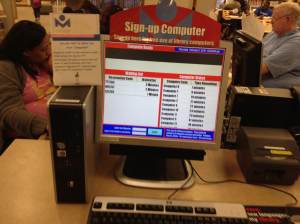In class last week we discussed the digital divide and the extent to which we can observe it in our own community or even in our own lives. The public library came up again as the place we would most likely go if we were ordinary, off-campus citizens (without our own campus labs) and needed to use a computer. Inspired by our conversation, I decided to visit the public library near my house and try doing my work there instead of in my own home, on my own laptop. What I saw there was both encouraging and eye-opening.
And I’ll fess up: I bailed on my “public access” plan that night.
Here’s what I saw: A dozen or so computers available, every one occupied by someone.
What I loved about the scene: all kinds of people, sitting in the same space, working and learning. My local library is a vibrant, lively place in the evenings, with people sitting at tables, reading and chatting, and using the free computers.
It was around 5 p.m. on a week day and I was surprised that a lot of children were there, in what looked like a class. (I figured they’d be home from school by then.) I also recognized an older man who often walks near the center of a main thoroughfare, toward the lake. He is very thin and sickly and I at first assumed he must be homeless (perhaps he is) or mentally challenged (perhaps that too) because he doesn’t use the sidewalk and instead charts a course practically into oncoming traffic, but he makes the walk regularly, in all weather, bundled up or not, carrying nothing. I’ll see him on my way to work, driving south as he walks north, and I always worry he’ll be hit by a car. Apparently, he also walks to the library (or perhaps he has a car after all).
I’m sharing that anecdote because one thing that surprised me was seeing that mysteriously familiar man, like an apparition, at the library. I think I could learn a lot more about the library’s role in my neighborhood by talking with that man.
Another thing I learned was how inconvenient the library is for computer usage in comparison to my own, sweet laptop setup. I won’t get into a lot of detail because (surprise!) that’s about to be your job, student readers.
But I will note this: To use a computer at my library you have to figure out the signing-up procedure (with a help of a nice but busy librarian), then you sign up and wait, on average 15 minutes, until one is available. Then you have exactly 60 minutes to do your work. If you need more time you can get back on the waiting list and sign up again for a 30-minute session. (You only get one full-blown 60-minute session per visit.)
Not too bad. But it requires some flexibility–you need to be able to concentrate in a small space surrounded by other busy people who may be chatting with one another, with their children, and so forth. You need to be able to get your work done in 60 minutes and/or be comfortable rotating through a waiting list in 30-minute increments while concentrating on your work. You need to be able to get to and from the library (OKC’s public transportation system is less than ideal–I didn’t see a bus stop near my library).
If you can master these things, you might learn to become a more focused and effective computer user (no time for Farmville if you only have 60 minutes to write that paper due in U.S. History tomorrow).
Honestly, I couldn’t take it–because I didn’t have to. I was hungry, I missed my dog, I had easily 4 to 6 hours of work to do that night, and I didn’t want the hassle of attempting to work in 60- then 30- then 30- then 30- minute installments. I nobly said to myself that it was unjust of me to put myself into the rotation when so many others would be waiting and they didn’t have the luxury of using their own computers that night. But honestly, it was the hassle factor, and the hunger, and the missing my dog. (Imagine if I had a child at home–what then?)
So this week’s blog homework is a Public Access Challenge: I want everyone in class to attempt, for 24 hours or so, to use a public computer instead of their own to get their work done, and then to document and reflect on that experience in a blog posting. I’ll post more details on this assignment to our homework page.
